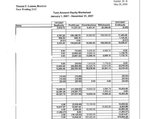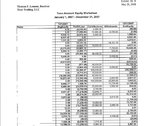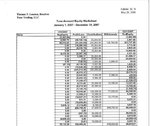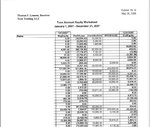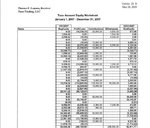You are using an out of date browser. It may not display this or other websites correctly.
You should upgrade or use an alternative browser.
You should upgrade or use an alternative browser.
15 min tlb
Senior member
- Messages
- 2,057
- Likes
- 99
What percentage is losers?
neil
Legendary member
- Messages
- 5,169
- Likes
- 754
donaldduke
Experienced member
- Messages
- 1,665
- Likes
- 260
What percentage is losers?
a quick google, the stats for Tuco were
206 traders
33 were profitable (16% of total)
7 had accounts > $50k in profits (3% of total)
So 26 people of those 33 were profitable, but not enough to make >50K a year, how many of those 26 would have eventually called it quits? i reckon most would have eventually found a better paying line of work..
tar
Legendary member
- Messages
- 10,443
- Likes
- 1,314
a quick google, the stats for Tuco were
206 traders
33 were profitable (16% of total)
7 had accounts > $50k in profits (3% of total)
So 26 people of those 33 were profitable, but not enough to make >50K a year, how many of those 26 would have eventually called it quits? i reckon most would have eventually found a better paying line of work..
It shows you that prop traders sucks as well , i bet same goes for Pit traders ...
jungles
Guest
- Messages
- 614
- Likes
- 67
most traders at forums suck, prop traders that suck arent prop traders for long
finding traders that dont suck takes a lot of digging
the leader has a DD of 1.92%, sharpe of 4.22, and about +150% across 5 accounts in 14mths
.......so they are out there
finding traders that dont suck takes a lot of digging
the leader has a DD of 1.92%, sharpe of 4.22, and about +150% across 5 accounts in 14mths
.......so they are out there
It shows you that prop traders sucks as well , i bet same goes for Pit traders ...
tar
Legendary member
- Messages
- 10,443
- Likes
- 1,314
most traders at forums suck, prop traders that suck arent prop traders for long
finding traders that dont suck takes a lot of digging
the leader has a DD of 1.92%, sharpe of 4.22, and about +150% across 5 accounts in 14mths
.......so they are out there
Yes ofcourse there are many profitable traders but still most traders lose whether retail traders , prop traders ... etc different survival rates but the majority fail and lose ...
Rhody Trader
Senior member
- Messages
- 2,620
- Likes
- 266
As for the consistency i don't see it necessarily to be profitable in every Q , some good traders may have a bad Q or 2 , i don't think it effects the consistency .
Judging consistency on a time basis in a properly thorough way necessarily requires a look at trade frequency in that time frame. You want to ensure that there are enough trades each period to have some statistical significance in the results. I haven't done a breakdown for the simple reason that the broker-reported figures are not parsed.
That said, something like 85% of the trades in my data set are closed within 24 hours and 95%+ are closed within a week. There will always be outliers, but generally speaking that level of trade frequency suggests sufficient activity is present to draw conclusions.
tar
Legendary member
- Messages
- 10,443
- Likes
- 1,314
Judging consistency on a time basis in a properly thorough way necessarily requires a look at trade frequency in that time frame. You want to ensure that there are enough trades each period to have some statistical significance in the results. I haven't done a breakdown for the simple reason that the broker-reported figures are not parsed.
That said, something like 85% of the trades in my data set are closed within 24 hours and 95%+ are closed within a week. There will always be outliers, but generally speaking that level of trade frequency suggests sufficient activity is present to draw conclusions.
Some traders may struggle for Q but ends the year positive , i would love to see how many are profitable on a yearly basis . Thanks .
15 min tlb
Senior member
- Messages
- 2,057
- Likes
- 99
What about running forums ?
Trading is a hard business , so when they blow out or struggle or lack emotional discipline , they run forums .
Here is how emotional traders can end up ,either winning or blowing out.
http://www.trade2win.com/boards/forex/164894-joe-john-method-live-calls.html
Some traders may struggle for Q but ends the year positive , i would love to see how many are profitable on a yearly basis . Thanks .
Profitable is one thing, how many can make more than the guy flipping burgers in McDonald's? What's the point in risking making a loss for such lowly rewards?
the hare
Senior member
- Messages
- 2,944
- Likes
- 1,282
Profitable is one thing, how many can make more than the guy flipping burgers in McDonald's? What's the point in risking making a loss for such lowly rewards?
Well ultimately, assuming you are serious, you are talking about scalability.
At the other end of the spectrum, I would suggest that in terms of personal development, a year trading your own account is far more valuable than a year flipping burgers (not that I've ever flipped burgers professionally)
I am sure that there are many things one could spend a year doing that are equally good from a personal development perspective, but working for the man at Maccy D's surely isn't one of them.
Ask oily el CID, he works at Burger King
tar
Legendary member
- Messages
- 10,443
- Likes
- 1,314
Profitable is one thing, how many can make more than the guy flipping burgers in McDonald's? What's the point in risking making a loss for such lowly rewards?
yes agree but if it was a good AROR that way he will build up his account and eventually will make serious money ...
Well ultimately, assuming you are serious, you are talking about scalability.
At the other end of the spectrum, I would suggest that in terms of personal development, a year trading your own account is far more valuable than a year flipping burgers (not that I've ever flipped burgers professionally)
I am sure that there are many things one could spend a year doing that are equally good from a personal development perspective, but working for the man at Maccy D's surely isn't one of them.
Ask oily el CID, he works at Burger King
Do the burgers actually get flipped?
I always figured some sort of 'press' came down and cooked both sides.
the hare
Senior member
- Messages
- 2,944
- Likes
- 1,282
I always figured some sort of 'press' came down and cooked both sides.
Well if it doesn't, you want to get the idea patented 😆
robster970
Guest Author
- Messages
- 4,567
- Likes
- 1,390
At the other end of the spectrum, I would suggest that in terms of personal development, a year trading your own account is far more valuable than a year flipping burgers (not that I've ever flipped burgers professionally)
I agree - I don't see myself or the world the same way as I did 5 years ago and the change has been a change for the better for me and my family.
gedward3
Established member
- Messages
- 928
- Likes
- 121
It shows you that prop traders sucks as well , i bet same goes for Pit traders ...
Pit trading is different Tar. I used to work on the floor at the IPE (oil) which is now ICE as it was bought out. The locals would mainly trade inter month spreads to make 500 to 1000 USD a day as their bread and butter. When they were trading these the exchange rules were that when the trade was registered as long as it was within the bid and offer of each month they were ok. So if it was trading at 100 bid 102 when they bought but was trading at 104 bid 105. They could still register a 102 trade which could run some stops n make the market move in their favour. Also watching the clerks in the booths signal a big order using hand signals. Clerk signals the trader in the pit that BP wants to sell say at $120.35 to hedge a delivery and price is trading at $120.45. The locals would all sell at $120.39/38/37/36 to make sure the price was hit to get the order executed to accelerate the price down n make money. Not saying its easy but being on the floor has its advantages. Also i saw more deals done in the toilets after the exchange closed with traders that had spare contracts to pick up a few extra quid.
Ged
tar
Legendary member
- Messages
- 10,443
- Likes
- 1,314
GedPit trading is different Tar. I used to work on the floor at the IPE (oil) which is now ICE as it was bought out. The locals would mainly trade inter month spreads to make 500 to 1000 USD a day as their bread and butter. When they were trading these the exchange rules were that when the trade was registered as long as it was within the bid and offer of each month they were ok. So if it was trading at 100 bid 102 when they bought but was trading at 104 bid 105. They could still register a 102 trade which could run some stops n make the market move in their favour. Also watching the clerks in the booths signal a big order using hand signals. Clerk signals the trader in the pit that BP wants to sell say at $120.35 to hedge a delivery and price is trading at $120.45. The locals would all sell at $120.39/38/37/36 to make sure the price was hit to get the order executed to accelerate the price down n make money. Not saying its easy but being on the floor has its advantages. Also i saw more deals done in the toilets after the exchange closed with traders that had spare contracts to pick up a few extra quid.
Ged
Yes ofcourse there is huge advantage for pit traders and i am sure they are much better than retail traders , most of them are market makers and scalpers , but what was their success rate , i bet it was under 50% ...
tar
Legendary member
- Messages
- 10,443
- Likes
- 1,314
Similar threads
- Replies
- 0
- Views
- 1K
- Replies
- 5
- Views
- 4K
- Replies
- 20
- Views
- 6K

